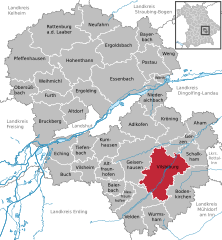Vilsbiburg
Vilsbiburg | |
|---|---|
 Town square | |
Location of Vilsbiburg within Landshut district  | |
| Coordinates: 48°27′N 12°21′E / 48.450°N 12.350°E | |
| Country | Germany |
| State | Bavaria |
| Admin. region | Lower Bavaria |
| District | Landshut |
| Government | |
| • Mayor | Sibylle Entwistle (SPD) |
| Area | |
| • Total | 68.85 km2 (26.58 sq mi) |
| Elevation | 449 m (1,473 ft) |
| Population (2023-12-31)[1] | |
| • Total | 12,621 |
| • Density | 180/km2 (470/sq mi) |
| Time zone | UTC+01:00 (CET) |
| • Summer (DST) | UTC+02:00 (CEST) |
| Postal codes | 84137 |
| Dialling codes | 08741 |
| Vehicle registration | LA, VIB |
| Website | www.vilsbiburg.de |
Vilsbiburg (German pronunciation: [fɪlsˈbiːbʊʁk], regional: Vib [fɪb]) is a town on the river Große Vils, 18 km southeast of Landshut, in the district of Landshut, in Bavaria, Germany. The city owes its name to the river Große Vils which runs through Vilsbiburg. As of 2019 Vilsbiburg has 12,203 inhabitants.
Geography
Vilsbiburg lies in the center of Lower Bavaria and is part of the Alpine foothills. The river Vils runs through the town center. Vilsbiburg is about 55 miles northeast of Munich.
History
10th to 18th Century
The first mention of a village named Pipurch is found around 1000 AD.[2] In records dating back to 1308, Vilsbiburg is mentioned as a market and also as a town, having a court and municipal powers. In 1648 more than half of the city's population died due to an plague epidemic. In 1760 the administrative office of the Pfleger of Geisenhausen, which was ancillary to the Rentamt of Landshut, was transferred to Vilsbiburg. Henceforth, Vilsbiburg held a market court with its own magistral powers.
19th and 20th Century
In 1803 Vilsbiburg received a section of the Landgericht Teisbach. As a consequence of administrative reform of Bavaria in the Gemeindeedikt von 1818 Vilsbiburg was officially recognized as a municipality.
Vilsbiburg officially acquired the status of a town in 1929.[3] On July 1, 1972 the administrative district of Vilsbiburg was merged into Landshut. The former municipalities of Frauensattling, Gaindorf, Haarbach, Seyboldsdorf and Wolferding became part of the town of Vilsbiburg in 1978.[4]
Mayors
Since 2020 Sibylle Entwistle (SPD) is the mayor.[5][6]
Former mayors:
- 1960–1990: Josef Billinger, SPD
- 1990–1996: Peter Barteit, SPD
- 1996-2020: Helmut Haider, Free voters
International relations
Vilsbiburg is twinned with:
Sons and daughters of the town
- Florian Gruber (born 1983), racing driver
- Markus Karl (born 1986), footballer SV Sandhausen
- Gisela Stuart (born 1955), British MP 1997-2017
References
- ^ Genesis Online-Datenbank des Bayerischen Landesamtes für Statistik Tabelle 12411-003r Fortschreibung des Bevölkerungsstandes: Gemeinden, Stichtag (Einwohnerzahlen auf Grundlage des Zensus 2011).
- ^ Die Stadt Vilsbiburg in den frühesten Nennungen Homepage of Vilsbiburg. Accessed October 14, 2007.
- ^ Vilsbiburger Geschichte Homepage of Vilsbiburg. Accessed October 14, 2007.
- ^ Gemeindeteile der Stadt Vilsbiburg Homepage of Vilsbiburg. Accessed October 14, 2007.
- ^ Bayerisches Landesamt für Statistik und Datenverarbeitung: Erste Bürgermeister/Oberbürgermeister in kreisangehörigen Gemeinden. Online auf statistikdaten.bayern.de, abgerufen am 12. April 2014.
- ^ Stadt Vilsbiburg: Bekanntmachung des Ergebnisses der Wahl des ersten Bürgermeisters am 16. März 2014. PDF. Online auf vilsbiburg.de, accessed 12. April 2014.
External links
- Official website (German)
- Unofficial website (German)




